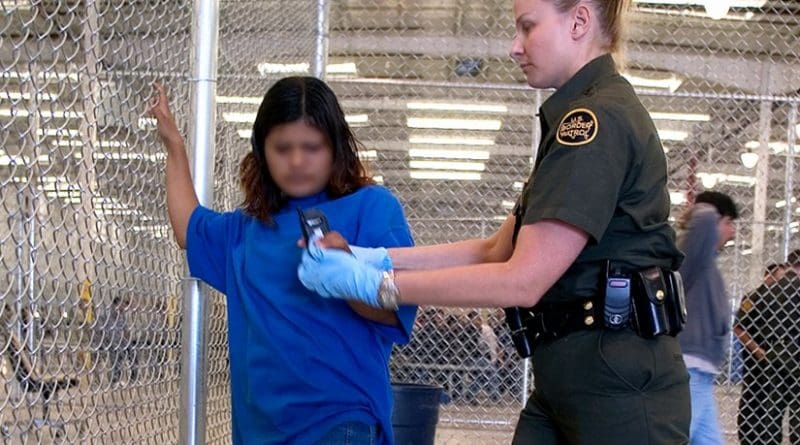California: Thousands Of Immigrant Parents Detained, Says HRW
New data analysis reveals that more than 10,000 parents of US citizen children are most likely detained every year in California by immigration authorities, Human Rights Watch said Monday. In light of new Trump administration policies likely to boost detention and deportation, the state of California should act to ensure that detained migrants are held in dignified and humane conditions and have access to lawyers.
The Human Rights Watch report, “‘I Still Need You’: The Detention and Deportation of Californian Parents,” is based on data obtained via a Freedom of Information Act request to federal immigration authorities. The data covers nearly 300,000 federal detentions of immigrants in facilities in California over a four-and-a-half-year span. Over that period, an average of about 65,000 immigrants a year were detained in California in 15 facilities. Many were parents of US citizen children. Although the records for most of the period do not specify whether detainees have US citizen children, the records for one nine-month span (October 2014 to June 2015) generally do, and statistical methods can reliably fill the gaps. Analyzing the records for that nine-month span, Human Rights Watch found that nearly half – 42 percent – of detainees had US citizen children.
“The rights of immigrants in the United States, including the parents of US citizens, are under greater threat than ever, especially people held in the immigration detention system,” said Clara Long, researcher in the US program at Human Rights Watch. “With 15 percent of all US immigration detainees held in California, state legislation aimed at enforcing humane detention standards and addressing fundamental due process failures is crucial.”
The need for human rights safeguards for detained immigrants is acute, Human Rights Watch said. The Trump administration has signaled its intention to place more people in a detention system that is notorious for its punitive and often inhumane conditions, including subpar medical care, which has contributed to deaths in custody that might have been prevented. In the context of the existing due process crisis in immigration adjudications, the administration has also announced plans to expand fast-track deportation procedures that have demonstrably harmed asylum seekers’ and others’ ability to get fair hearings.
Two measures under consideration by the California state legislature would address human rights abuses in immigration detention. The assembly is currently considering a budget revision released on May 11, 2017, by Governor Jerry Brown that would allocate US$15 million in state funds to provide lawyers for people in immigration detention in California. A recent study found that 68 percent of detained immigrants in California do not have legal representation and that detained immigrants who had counsel prevailed in their cases, and were allowed to stay in the country, at five times the rate of those who did not.
“Everyone should have a right to fair adjudication in deportation proceedings,” Long said. “State leaders should address due process gaps for everyone in immigration detention no matter their situation or history.”
Another measure, Senate Bill 29, would require California jails to meet specific civil detention standards when holding immigrants, including access to legal services, medical care, freedom from harm or harassment, and privacy. It would also prohibit an immigration detention facility from placing a detainee in segregated housing involuntarily because of their actual or perceived gender, gender identity, gender expression, or sexual orientation. The bill would prohibit California cities and counties from renewing or entering into new contracts with for-profit detention companies. While Human Rights Watch takes no position on the use of for-profit facilities, the bill’s other provisions would be crucially important tools to prevent abuse in detention.
“The consequence of immigration authorities’ failure to enforce applicable standards can quite literally be death,” Long said. “California should take this opportunity to ensure that no immigrant is held in substandard and undignified conditions within its borders.”

